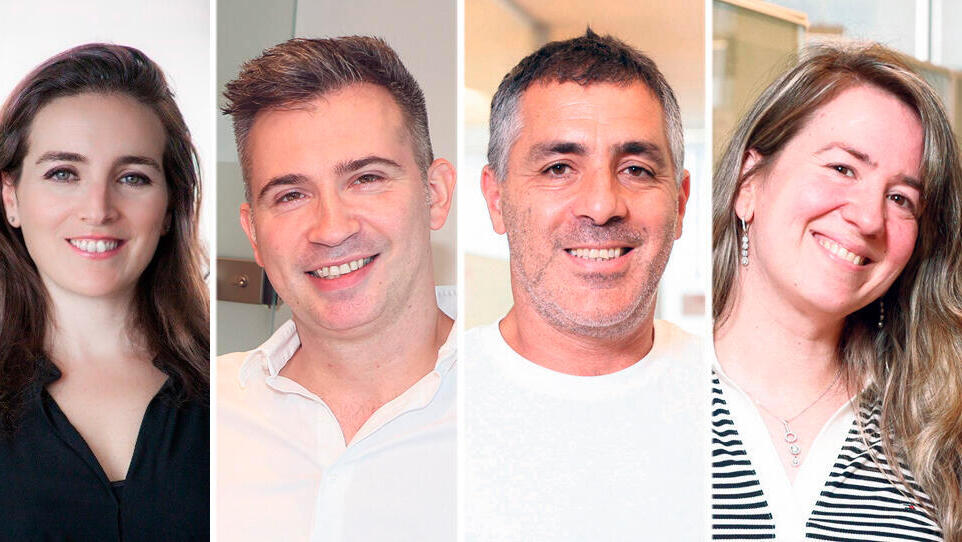
Michal Kissos Hertzog: "High-tech must be given the conditions that will continue to drive it forward"
The Poalim Tech CEO was speaking as part of her summary of the Growth+ mentoring project of Calcalist and Poalim Tech, which stressed the strengths of Israeli high-tech but also the concern about the current crisis and the necessity for the state to act.
Israeli high-tech is in one of the most complex periods in its history. On the one hand, the industry faces economic challenges following a global crisis, with a local war and political challenges in the form of judicial reform that undermine Israel's position as an investment destination. On the other hand, there are significant exits of established companies that bring substantial funds and hope to the industry, which desperately needs it these days.
To get an up-to-date picture of the situation and a look into the future, we spoke with some of the industry leaders who participated as mentors in the Growth+ project of Calcalist and Poalim Tech. This project aims to strengthen the resilience of the high-tech industry in Israel by holding 1:1 meetings between experienced entrepreneurs and start-up companies at the beginning of their journey. The purpose is to advise, support, and provide knowledge about entrepreneurship and creativity, managing start-ups, and building companies for growth. About 100 startups registered for the project, and from them, 16 were selected from different fields such as e-commerce, software, green-tech, and biotech. These were mentored by 16 senior industry leaders who shared success stories and various challenges to support entrepreneurs and share their experience.
1 View gallery


From left: Paolim Tech CEO Michal Kissos Hertzog, Armis CEO Yevgeni Dibrov, Fiverr President Ofer Katz, Nexite CEO Anat Shakked
(Photos: Yariv Katz, Orel Cohen, Avigail Uzi)
We wanted to hear from the mentors whether Israel will succeed in remaining a leader in global technological innovation, whether the high-tech industry will overcome its current challenges, and how they see the ability of companies to recruit and acquire others. We also sought their insights on their experience as mentors in the project.
"The state piles up difficulties instead of helping"
"The rumor about the deal being forged between Wiz and Google is a great opportunity to see the story of Israeli high-tech up close: it is a super happy, morale-boosting, and confidence-inspiring event, like Israel winning the Eurovision. A phenomenal success story of four talented entrepreneurs, who have already done it before. It’s a deal that will bring substantial income to Israel. And every Israeli, whether they are an English teacher or the commander in 8200, feels that they have a part in it, and everyone, including me, is of course happy and proud. But - if you look at the event with sober eyes, you see that, unfortunately, the state had nothing to do with it," says Michal Kissos Hertzog, CEO of Poalim Tech.
"It is of course true that the state offers tax benefits to encourage entrepreneurship, as part of the tech strategy of the 2000s. It is also true that a young entrepreneur can, and should, establish a company in Israel due to the low tax rates. It is true that the army trained some of the entrepreneurs. But on the other hand, every beginning entrepreneur knows that the country also piles on high-tech many bureaucratic and other difficulties, which make entrepreneurs feel the exact opposite of being embraced. At the same time, Israel's current reputation has turned it from a start-up nation to a war nation, with the judicial reform hovering above all, which calls out to these investors instability, these by the way, are not political opinions or feelings, but facts that every entrepreneur and investor encounters every day, with great concern," she says.
Indeed, Ofer Katz, the president and CFO of Fiverr, an entrepreneur and veteran investor, testifies that he is concerned about the situation. "I see great minds leaving the country, I see less money going to the companies that stay in the country," he says and describes the challenging reality of workers who juggle between work and serving in the IDF reserves, and women who face the absence of their spouses. Despite this, Katz also sees "a great deal of resourcefulness and companies that manage to establish operations in conditions of uncertainty, raise funds, and investors who come to Israel make investments."
Yevgeny Dibrov, CEO and co-founder of Armis, mentions that the tech industry is the engine of the economy. "This is true in normal times - and even more so in a crisis," he emphasized. "Since October 7, the high-tech sector mobilized for the national effort even more strongly: it contributed, volunteered, enlisted in the reserves en masse, and at the same time continued to advance the economy." According to him, the difficulties will lead to the creation of resilience: "The trauma we experienced, and the maturity that the companies show to this day in order to maintain business continuity, produce here stronger and more durable managers, entrepreneurs, and employees. Our national resilience also depends on the economic recovery of the country, and high-tech has a big part in that."
And the resilience of the industry was revealed in its full strength in the face of the crises. "Despite our circumstances today, geopolitically speaking, Israel continues to attract venture capital and boasts a highly educated workforce, which shows extraordinary resilience," says Anat Shakedd, CEO and co-founder of Nexite.
While the last few years were characterized by an abundance of available capital, which was poured into young and older start-up companies, the situation today is more complex. "I think it is more challenging today than in recent years and it is known that the total scope of recruitment by Israeli companies has been significantly reduced," says Katz. However, he says that "really successful companies manage to raise good values and excellent investors and continue to develop at a fast pace."
Shakedd adds that "next year investment in startups will depend on interest rates and inflation. If the economic trends stabilize and we see a return to political stability, we must obtain more venture capital activity among startups at a later stage that can prove their product fits the market and show concrete indicators of growth." High-growth sectors such as artificial intelligence, chips, climate technologies, and cyber security are still expected to be attractive and attract funding. Also, a focus on sustainability with new laws coming into effect in the coming years creates a sense of urgency that can have a strong impact."
"More appetite for acquisitions and mergers"
In periods of uncertainty, there seems to be an increase in acquisitions of companies by both Israeli companies and Israeli companies by international corporations. "There is a lot of activity in the mergers and acquisitions market," says Katz. "We see Israeli companies like Wiz and JFrog making significant purchases as part of their growth strategy."
Dibrov adds that "there is no doubt that the high-tech field in general, and the cyber field in particular, have experienced consolidation. The largest corporations, the largest customers, are looking for fewer different cyber security solutions, and more platforms that provide a holistic answer to their variety of needs. This means for the ecosystem that there are fewer lone feature solutions and more appetite for acquisitions and mergers."
When it comes to raising capital, Dibrov says that what is important to remember is that raising capital is a means and not an end, and each company will act in the coming year according to its business plan and its strategy going forward.
In order for high-tech to continue to be the engine of the economy, Kissos Hertzog believes that the leadership must take care of providing the conditions for its flourishing. "It's sad to say this, but being Israeli today is not popular and we all pay a price for it, especially high-tech, which is required to maintain business relations with international parties, with high regulation, corporate responsibility, and compliance requirements," she said. "The leadership in Israel must take seriously the question of how to give Israeli high-tech the conditions that will continue to spur it forward. If the answer, and just as importantly, the accompanying action, are not quick and significant, we may see more and more of our Israeli brothers and sisters succeeding in spectacular high-tech deals that have nothing to do with the state, through 'offshore' companies that will even deprive it of jobs or tax profits.
"Fortunately, at this time, the entrepreneurs I meet still show a deep, stable, and very loving connection to their country. But they also look at the relationship with the investors with sober eyes, and likewise at what is happening in the country, and without support from the leadership, and a change in the treatment of human capital here, we don't leave them much of a choice. But since we have no other country, as Golda Meir once said, then we have to change and we have to fix things, because when it comes down to it we really have no choice."













